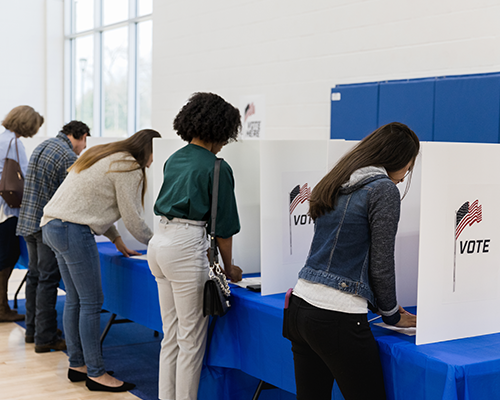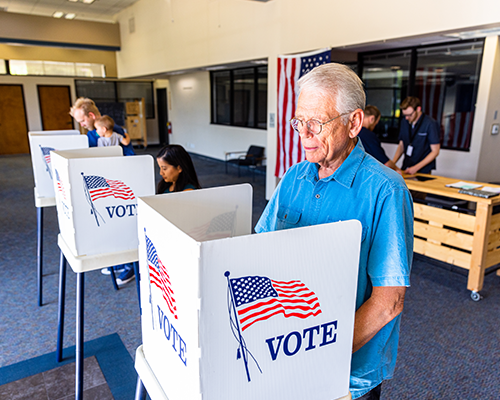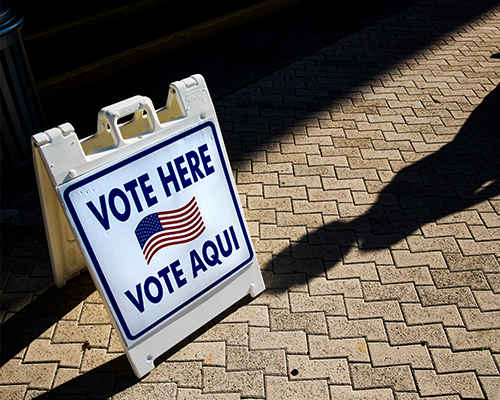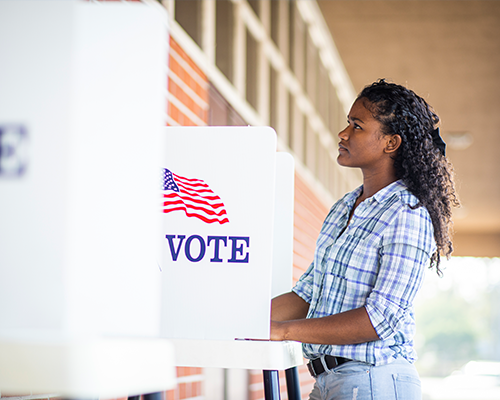
How Does Michigan Prepare To Run A
safe & secure election?









Getting Ready To Administer Elections
Michigan hires tens of thousands of poll workers to support its local, county, and state-level elections officials every election cycle. With a strong decentralized elections process, all 1,520 of the state’s cities and townships each administer their own federal, state, and local elections.
These poll workers and officials receive training on how to run a Michigan election in compliance with state and federal law.
The local election commission and clerk in each township or city in Michigan work together to identify voting precincts and select suitable polling places that will accommodate the number of voters in their location. Many polling places are located in familiar places in the community – including churches and schools.

Preparing Paper Ballots
All votes in Michigan are cast on a paper ballot. There is also a paper tally of all votes cast in Michigan elections.
In advance of each election, every county board of elections commissioners prepares the ballots needed for an upcoming election. State law requires them to make sure every precinct in the county has a sufficient number, and sets guidelines for how to decide this.
The commissioners calculate how many ballots they need by looking at the last four elections, determining which had the highest number of votes cast, and preparing 25% more ballots than that number of votes. This allows the commissioners to prepare adequately for high voter turnout.
Testing voting machines
Before every election, election-related equipment is examined and tested, to ensure they will work properly throughout the election. This includes voting machines as well as any backup equipment. These tests can take days or weeks, and any discrepancies uncovered in the testing are promptly documented, examined, and resolved.
This process includes doing “logic and accuracy” testing of both voting tabulators – the machines that scan and count paper ballots – and Michigan’s voter assist terminals (the machines that mark ballots for voters with disabilities). This rigorous testing process uses the actual data and sample ballots for the upcoming election to ensure the machines are programmed correctly. It can also be used after an election to demonstrate that nothing in the machines’ programming has changed.
During a logic and accuracy test, elections officials will:
- Verify that election-specific data programmed in the machines and the paper ballots include every contest, candidate, and precinct in the election.
- Verify that all parts of the machines and voting systems are functioning correctly.
- Verify that the voting system being testing interprets marks on sample ballots and records and reports vote totals accurately.
Pre-election logic and accuracy testing in Michigan involves multiple stages of testing and documentation, including:
- A preliminary accuracy test.
- This is conducted as soon as the clerk receives the relevant programming and ballots for the election.
- A public accuracy test, which any member of the public may observe.
- This test must occur no later than 5 days before the election, and notice must be published at least 48 hours before the test will be conducted.
While Michigan municipalities select their own voting systems, they must be tested by an accredited lab and certified as complying with legal requirements by the Board of State Canvassers. Paper ballots are always preserved after voters cast their vote so that the accuracy of voting machines can be verified.
In Michigan, no voting machines are connected to the internet while the polls are open.
In response to various claims, Michigan Senate Republicans conducted a thorough review and found no evidence that Dominion voting systems had been hacked in the 2020 election.
Counties regularly invest their federal election funding into upgrading the cyber and physical security of their election systems and voting facilities. Voting machines are routinely publicly tested ahead of each election in order to ensure they will provide accurate results.
Resources: